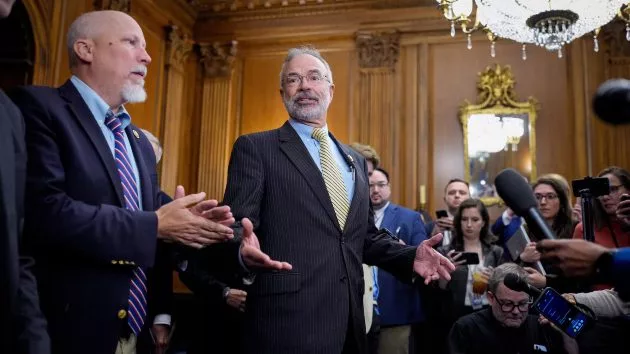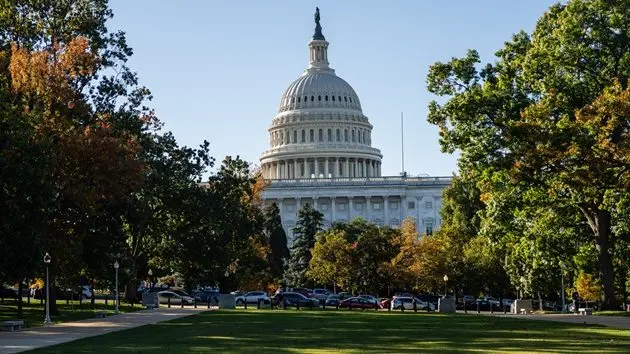(WASHINGTON) — The future of President Donald Trump’s “One Big Beautiful Bill” that would fund his second-term agenda could depend on SALT.
The State and Local Tax deduction has been a wedge between Democrats and Republicans but now a division between GOP House members from high-tax districts and fiscal hardliners who look at it as subsidizing blue states.
Adding more confusion over the debate is the president himself, who has flipped since his first term in office.
What is SALT?
The SALT deduction allows taxpayers to itemize state and local taxes in their filing, including property taxes.
Residents of states like New York, New Jersey and California, along with cities like Salt Lake City, Miami and Houston, which have a larger share of wealthier taxpayers and homeowners, used the deduction the most, according to IRS data.
The Tax Foundation, a non-profit that analyses tax data, found in 2017 that about 90% of the value of the deduction went to families making more than $100,000.
Prior to 2017, taxpayers had an unlimited total SALT deduction. The average SALT deduction was around $13,000 nationwide and below $15,000 in most counties, according to the non-profit group the Urban-Brookings Tax Policy Center.
Fissures develop after Trump puts limits on SALT
During his first term, Trump’s massive 2017 Tax Cuts and Jobs Act made huge cuts to federal spending to pay for tax breaks for wealthier Americans. The bill capped the SALT deduction at $10,000.
Democrats and Republicans in those states that had benefitted from the higher SALT cap protested against that section of the bill, arguing that it would harm their constituents.
“It’s a geographic redistribution of wealth,” then-New York Republican congressman Lee Zeldin told CNBC in 2017. “When you are taking extra money from a state like New York or New Jersey to pay for a deeper tax cut elsewhere.”
Zeldin, who was Trump’s pick to head the Environmental Protection Agency in his second term, was among the 13 Republican House members who voted against the bill.
House Republicans, who ultimately prevailed, contended that SALT benefited the wealthiest Americans.
“This is about giving hardworking taxpayers bigger paychecks, more take-home pay,” then-Speaker Paul Ryan said after the bill passed the House.
Senate Minority Leader Chuck Schumer has repeatedly slammed Trump and Republicans for capping the SALT deduction and called for it to be eliminated.
“Congress has placed a bullseye on New York State — you don’t have to be a partisan nose to smell a rat, but I tell you, this plan stinks,” he told reporters in 2017.
Trump ignored the criticism then, but his messaging changed after he was voted out of office in 2020.
Trump changes his tune, but not everyone plays along
During the 2024 presidential campaign, Trump pledged to end the cap. He didn’t mention that he championed and signed the 2017 bill that created it.
“I will turn it around, get SALT back, lower your Taxes, and so much more,” Trump posted on Truth Social in September, just before a campaign rally in Nassau County, New York, one of the counties with the most SALT deductions.
He made the same claim at the rally, but didn’t offer any details.
While New York Republicans welcomed the reversal, Democrats, including Schumer, called Trump out for his hypocrisy.
“His tax bill did it, a dagger aimed at blue states that want to spend a little more to help people with housing, and health care, and education, transportation,” Schumer said on the Senate floor the day after the rally. “All of a sudden, now that he is on Long Island, Donald Trump’s selective amnesia kicks in and he totally reverses himself on SALT.”
Trump has continued to push for SALT changes, but not everyone in his party has jumped on board.
Salt in the budget wounds
SALT has become a sticking point in Republican infighting over Trump’s “Big Beautiful Bill.”
Several GOP House members, including Rep. Mike Lawler of New York, vowed to vote no on the bill without a SALT cap increase.
“So, this is, as it stands, I have been very clear. This does not have my support,” he told reporters last week.
Lawler said Republican hardliners were “screwing a whole host of people who are getting hammered by property taxes.”
GOP Rep. Nick LaLota of New York declared “there is no deal without a true SALT fix.”
Exasperated House GOP fiscal hardliners pushed back against any deal to raise the SALT cap as they seek to reduce the debt.
“You need to get behind the cuts that we need to find the savings that we need to find. Stop b—-ing,” Rep. Eric Burlison, R-Mo., said of his colleagues pushing to raise the SALT cap. “The reality is, we’re $37 trillion in debt and we have a $2 trillion deficit. This is a math problem.”
In a meeting with House Republicans on Tuesday, Trump told them “Don’t let SALT impede this bill,” claiming they could fight for raising the cap later.
An overnight tentative deal that would raise the cap to $30,000 threatened GOP leadership’s hopes to get the bill to the floor for a vote.
Rep. Andy Harris of Maryland, chairman of the conservative House Freedom Council, said the SALT deal pushes hardliners “further away from a deal.”
“This bill actually got worse overnight,” Harris told Newsmax on Wednesday. “There is no way it passes today.”
“We may need a couple of weeks to iron everything out but it’s not going anywhere today,” he said.
Hardliners were to meet with Trump on Wednesday afternoon to see if he can break the impasse.
Copyright © 2025, ABC Audio. All rights reserved.





